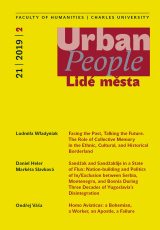Facing the Past, Talking the Future
The Role of Collective Memory in the Ethnic, Cultural, and Historical Borderland
DOI:
https://doi.org/10.14712/12128112.3246Klíčová slova:
collective memory, visual analysis, photo-elicitation interview, borderlandAbstrakt
The paper presents the results of research conducted in the town of Teplice, in the Czech-German borderland. The assumption of the study is that the communicative memory in the region of borderland is a process that involves not only the members of a borderland region, but also documents of memory, in this case visual documents circulating on Internet. This process of creating communicative memory occurs in a hermeneutical triangle that includes the communication / interaction between memory users, memory makers, and visual objects of representation. The meaning of the particular elements of the borderland collective memory is constantly negotiated. The objective of the discussed research is to study the role that communicative memory plays in the cultural, ethnic, and historical borderland.
Stahování
Publikováno
Jak citovat
Číslo
Sekce
Licence

Tato práce je licencována pod Mezinárodní licencí Creative Commons Attribution-NonCommercial-NoDerivatives 4.0.


